'There has to be a way for us to co-exist with travellers'
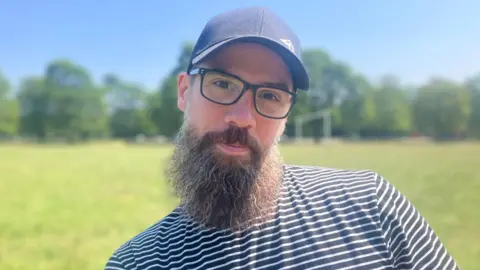 BBC / Elizabeth Baines
BBC / Elizabeth BainesAfter social media posts detailed anti-social behaviour, intimidation and property damage from a travelling encampment in Roundhay Park last month, Leeds North East MP Fabian Hamilton said he wanted authorities to be granted powers to move travellers on more quickly.
When the BBC visited the park, people enjoying the public space said it was not the presence of travellers that was their concern, but the "mess" left behind.
"I have no problem with them being here," James Robertson said, as he walked his dog through Soldiers' Field.
"It is part of their culture and they travel about; I chatted to a couple of them and they are all right."
The 39-year-old said while he was "not bothered" about groups camping on public land he was "slightly annoyed" by mess.
"I think there needs to be a bit more of a provision in place for when they are here; in previous years, they have set up skips but this time there was nothing."
Mr Robertson said discarded wood chippings, flagstones and pipes could be seen on Roundhay Park after the travellers left last month.
"It is fly-tipping at the end of the day," said Mr Robertson.
"I just think we need to work out a way to co-exist together so that everyone is happy."
A number of incidents of anti-social behaviour, including vandalism to allotments, had been reported while travellers were staying at the park in recent months and years.
Plot holder Katherine Gilboy said her father had been "pelted with rocks" by children from the camp in March.
"When challenged, they ran out through a hole that they made in the fence and then just continued to keep coming back and throwing rocks at various people at the allotments," she said.
Ms Gilboy also complained of people defecating in the plots.
She said: "It is obviously incredibly traumatic and unhygienic, especially where people are trying to grow their own fruit and vegetables.
"It got to the point where a number of people don't feel safe being on their allotments and have had to leave."
West Yorkshire Police said it had increased patrols in the area while the travellers were present and had monitored behaviour at the camp.
A spokesperson for North Leeds Cricket Club said they lost "thousands a year" due to vandalism and cancelled events because of travellers, describing the impact in recent years as "hell".
"The worst year was over £10,000," they said.
"We have gone past the point of being angry or upset. It's something we have just become accustomed to now."
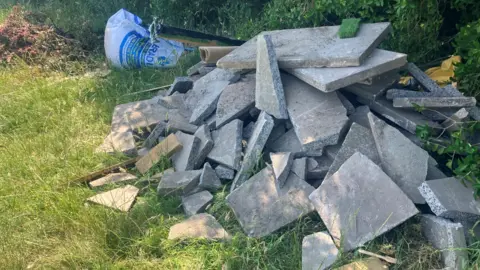 BBC / Elizabeth Baines
BBC / Elizabeth BainesLocal authorities have legal powers to evict unauthorised campers from land they own, and the police can act if there is disturbance, disruption and anti-social behaviour.
Labour's Hamilton, who represents the Leeds North East constituency, said he wanted "legislation that allows orders granted instantly, so that removal can take place within hours, if not a day or two, rather than days and weeks".
Roundhay resident Tony Quinn said that quicker removal would only "speed up the merry-go-round" of eviction and push the groups to other areas.
"If the decision is taken to evict people who have unauthorised access on Roundhay Park they will just end up at Fearnville or Thorner or Temple Newsam," he said.
"They would just be on a faster roundabout."
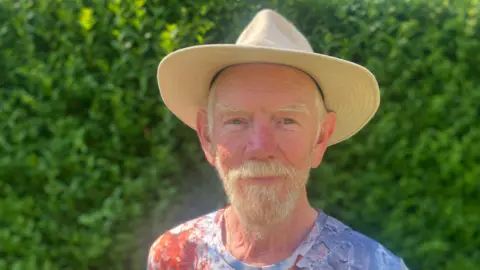 BBC / Elizabeth Baines
BBC / Elizabeth BainesThe 69-year-old has been a member of the Friends of Roundhay Park for 30 years and said he felt "quite strongly" about keeping the park in good condition.
He said to see it "being used as a garbage tip" was distressing.
Following Hamilton's comments, Leeds City Council said it "considers the potential for negotiated stopping for all unauthorised traveller encampments within the Leeds boundary".
Negotiated stopping is an agreement pioneered by the charity Leeds GATE (Gypsy and Traveller Exchange).
The policy works when an encampment agrees to work with the local authority, allowing them to stay on the land no longer than 28 days.
Travellers pledge to leave the site clean, using toilets and skips provided for them.
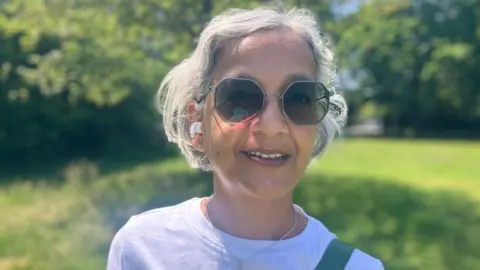 BBC / Elizabeth Baines
BBC / Elizabeth BainesSince travellers left Roundhay Park, the council has placed boulders at entry points to the green space to block vehicular access, though a number of caravans were seen on the park again on Saturday.
Nita Mistry told the BBC a wider West Yorkshire strategy was needed to allocate suitable spaces for travellers to camp.
The 58-year-old, who lives nearby and walks her dog regularly on Roundhay Park, said: "There must be green spaces that are suitable.
"Then you give them a set time to be there in which case they move on to another allocated green space so it is controlled.
"I think pushing them too quickly without anywhere to go just creates another problem elsewhere."
Nomadism is not illegal in the UK but travellers can only park on authorised sites which can be either council-owned or privately-owned under a licence.
Unauthorised encampments can be considered a breach of civil law.
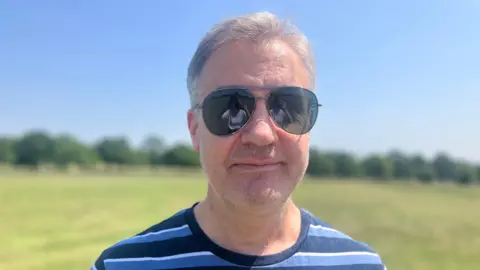 BBC / Elizabeth Baines
BBC / Elizabeth BainesMs Mistry believes travelling communities should be able to move from place to place "with ground rules".
"I think we've all got different ways of life, I come from an ethnic minority group and we live in a way that is harmonious with the rules and the laws of this country.
"We have all got to share these spaces and you need some rules around how we share those spaces so we can all live harmoniously."
Ian Longford, who walks on Roundhay Park during his lunchbreak, said travellers should have the right to pull up on public land as "there is plenty of room".
"I do not mind them stopping here, as long as they are not bothering other people or just leaving a mess behind really.
"I do not think you will gain any benefit from forcing them to conform to what everyone else does."
Listen to highlights from West Yorkshire on BBC Sounds, catch up with the latest episode of Look North.
